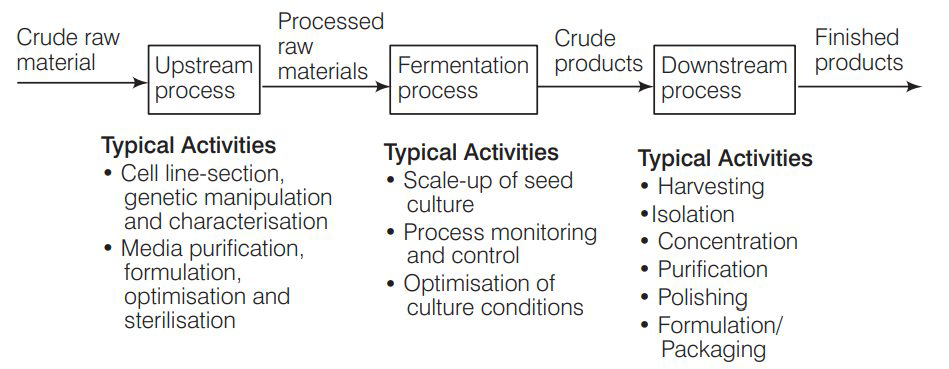Taking examples under each category, discuss upstream and downstream processing.
The fermentation process is the basis of many industries in order to produce diverse products. Fermentation means a process in which microorganisms that are cultured on a large scale, convert a substrate into a product which is useful to human.
The fermentation process is divided into two stages namely Upstream and downstream processing both of these processes can be discussed taking an example of citric acid production. The upstream processing in biotechnology involves identifying a material. This forms the initial process of fermentation. It deals with inoculum preparation, preparation of culture media, scale up of the entire process and inoculation.
The upstream processing in biotechnology involves identifying a material. This forms the initial process of fermentation. It deals with inoculum preparation, preparation of culture media, scale up of the entire process and inoculation.
When the products are subjected to a series of processes including separation and purification of the product, it is collectively known as downstream processing. It deals with the post-harvest product, i.e., recovery-clarification, purification, polishing and formulation till the packaging of the desired product.
Define antigen and antibody. Name any two diagnostic kits based upon them.
An antigen is a foreign substance that elicits the immune response and results in the formation of an antibody.
Antibody is a protein that is synthesised by the body in response to an antigen.
Antigen and antibody shows high degree of specificity in binding to each other.
Two diagnostic kits based on antigen-antibody interaction are
(a) ELISA for HIV.
(b) Pregnancy test kits.
ELISA technique is based on the principles of antigen-antibody interaction. Can this technique be used in the molecular diagnosis of a genetic disorder, such as phenylketonuria?
Yes, one can use antibody against the enzyme (that is responsible for the metabolism of phenylanaline) to develop ELISA based diagnostic technique. The patient, in which the enzyme-protein complex is absent would give a negative result in ELISA when compared to the normal individual.
How is a mature, functional insulin hormone different from its pro-hormone form?
Mature functional insulin is obtained by the processing of pro-hormone which contains an extra peptide called C -peptide or connecting peptide.
It connects the A and B chains in proinsulin. This C -peptide is removed during the maturation of pro-insulin to insulin and A and B chains gets linked by disulphide linkage.

Gene therapy is an attempt to correct a genetic defect by providing a normal gene into the individual. By this the normal function can be restored. An alternate method would be to provide the gene product (protein/enzyme) known as enzyme replacement therapy, which would also restore the function. Which in your opinion is a better option? Give reason for your answer.
Gene therapy would be a better option because it has the potential to completely cure the patient. It is because the correct gene once introduced in the patient, can continue to produce the correct protein enzyme. Enzyme therapy does not offer permanent cure as it needs to be given to the patient on regular basis. It is also more expensive.